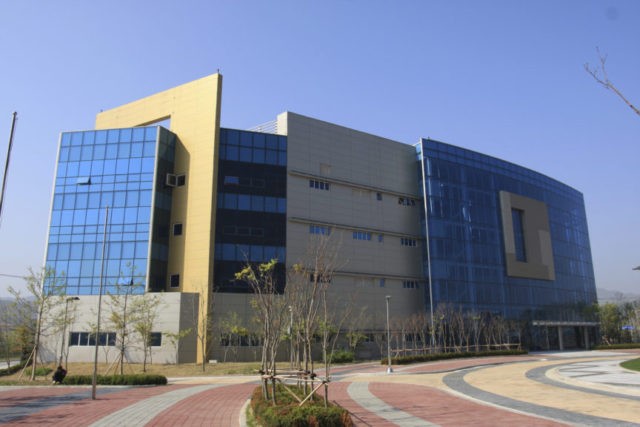The governments of North and South Korea announced on Friday that they had agreed to open two liaison offices, one for each country, on their mutual border that would allow for “round-the-clock communication.” The offices will be located in the same building.
Opening liaison offices to make direct communications between the South Korean government and the Kim regime was one of the several agreements leftist President Moon Jae-in made with dictator Kim Jong-un during their summit in Panmunjom, a border village in the demilitarized zone (DMZ) that served as the setting for two summits.
The office opening occurred just days before Moon is scheduled to fly into Pyongyang for his third summit with Kim, the first held outside of the neutral territory in Panmunjom.
According to South Korea’s Yonhap news agency, the two countries have agreed to establish these offices in another border town, Kaesong, where Seoul had once agreed to build an industrial complex for cooperation with the north. South Korea ultimately shut down the Kaesong complex in 2016 following a series of belligerent threats from their communist neighbor.
“The inter-Korean joint liaison office is a channel for round-the-clock communication in the new era of peace,” South Korea’s Unification Minister Cho Myoung-gyon reportedly said in a speech at an event observing the opening of the offices, attended by about 50 people from each country. “From today, South and North Korea can have direct consultations 24 hours a day and 365 days a year over issues relating to advances in inter-Korean relations, peace and prosperity on the Korean Peninsula.”
Ri Son-gwon, an official representing Pyongyang, said at the opening event that he hoped the offices would serve to allow the resolution of bilateral disputes in “a speedy and heart-to-heart manner.”
Part of the operations held at this new office will include weekly meetings between the two heads of the countries’ respective offices. The building being used is a four-story office complex that once served as the Inter-Korean Economic Cooperation Consultation Office. North and South Korean officials will work on different floors of the office to allow for some privacy, according to South Korea’s JoongAng Ilbo.
Reports on remarks made at the opening ceremony for the offices did not indicate how much this project will cost or who will pick up the bill. Its opening follows a tumultuous week for Moon and his leftist government, as conservatives in the nation’s legislature increasingly object to the extravagant funds needed to keep diplomacy with North Korea ongoing. Moon’s cabinet approved a plan on Tuesday to implement the Panmunjom Declaration expected to cost South Korea alone around $418 million.” Seoul has already spent million on lodging for North Korean envoys, particularly during February’s Winter Olympics; dinner meetings with North Korean officials; and setting up artistic exchanges and performances to amuse Kim Jong-un.
The $418 million the cabinet set aside is reportedly intended for infrastructure development in North Korea, which outraged members of the conservative Liberty Korea Party who noted that Kim Jong-un has made no concrete steps towards ending his illegal nuclear program, allegedly the entire objective of having any diplomacy with the North.
This money is in addition to another nearly billion dollars that the South Korean Unification Ministry earmarked for “cross-border initiatives” with Pyongyang.
The next expense on the list for Moon is his visit to Pyongyang, which he is expected to make along with an entourage of over 200 people, according to JoongAng Ilbo. The last time a South Korean president visited the North Korean capital occurred in 2007, though President Roh Moo-hyun did not fly into the capital at that time.
South Korean officials confirmed that the North has agreed to broadcast parts of the summit live, a rarity in the extremely repressed social atmosphere of the North. The country rarely broadcasts live programming, even failing to do so last weekend for the nation’s Foundation Day parade, attended only by senior North Korean bureaucrats and their Chinese allies.
President Moon Jae-in appeared optimistic discussing his visit on Thursday.
“North Korea is willing to denuclearize and therefore willing to discard existing nuclear weapons … and the US is willing to end hostile relations with the North and provide security guarantees,” Moon told reporters, according to the Agence France-Presse (AFP). “But there is a blockage as both sides are demanding each other to act first and I think they will be able to find a point of compromise.”

COMMENTS
Please let us know if you're having issues with commenting.